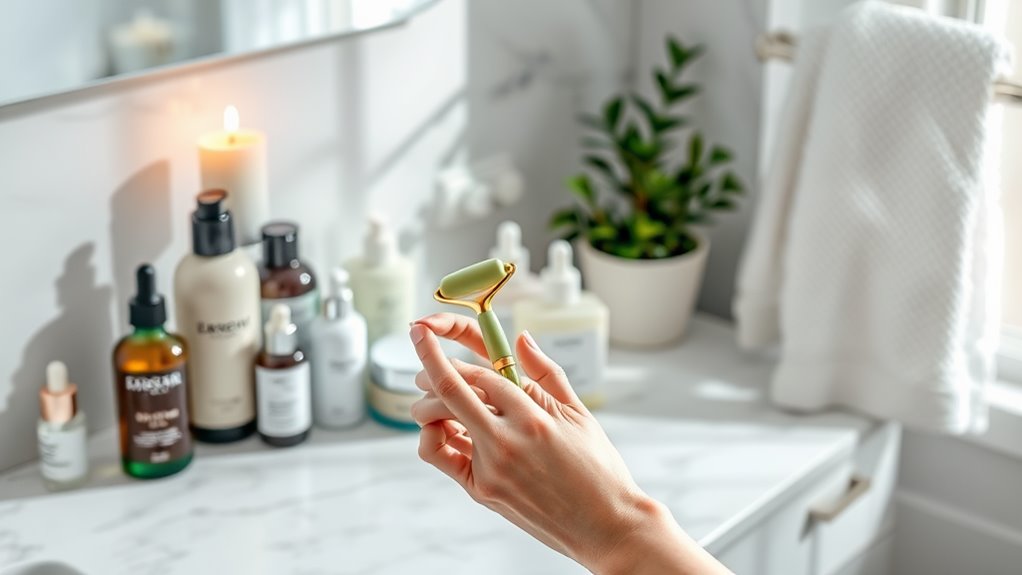Skincare During Stressful Times- What Really Helps
During stressful times, your skin may react negatively due to increased cortisol levels, leading to issues like acne and dryness. To combat this, use calming ingredients such as hyaluronic acid, glycerin, and botanicals like chamomile. Establish a consistent skincare routine with a gentle cleanser, moisturizer, and sunscreen. Additionally, incorporating relaxation techniques, such as yoga and nutrition rich in omega-3s, can greatly improve resilience. Discover more about maintaining skin health amidst stress and effective strategies for support.
Understanding the Impact of Stress on Skin
How does stress affect your skin?
Stress triggers the release of cortisol, which can lead to increased oil production, resulting in acne and other breakouts.
Additionally, stress can compromise your skin’s barrier function, leading to dryness and irritation. You might notice heightened sensitivity or exacerbated conditions like eczema and psoriasis.
Moreover, stress can impair blood circulation, depriving your skin of essential nutrients and causing a dull complexion. This physiological response underscores the importance of understanding the connection between stress and skin health, as managing stress can significantly improve your skin’s condition.
Thus, incorporating effective skincare for stress is essential. Focus on gentle, hydrating products that strengthen your skin’s barrier and promote healing, helping you maintain a healthy, vibrant appearance during challenging times.
Key Ingredients to Look for in Skincare Products
When selecting skincare products during stressful times, prioritize hydrating ingredients like hyaluronic acid and glycerin, which enhance moisture retention. Additionally, incorporating soothing botanicals such as chamomile and aloe vera can help calm irritated skin. Understanding these key components will empower you to make informed choices for healthier skin. Hyaluronic acid is known for its ability to retain moisture in the skin, making it an essential ingredient during times of stress.
Hydrating Ingredients Essential
Hydration is essential for maintaining skin health, especially during stressful periods when your skin may become more reactive and dehydrated.
To support your skin’s moisture barrier, look for the following hydrating ingredients in your skincare products:
- Hyaluronic Acid: Attracts and retains moisture, plumping the skin.
- Glycerin: A humectant that draws water to the skin’s surface.
- Sodium PCA: Naturally occurring in the skin, it helps bind moisture.
- Urea: Provides hydration and enhances skin barrier function.
- Panthenol (Vitamin B5): Improves moisture retention and soothes irritation.
Incorporating these ingredients can greatly enhance your skin’s hydration levels.
Soothing Botanicals Benefits
Stress can trigger inflammatory responses in the skin, leading to irritation and discomfort.
Incorporating soothing botanicals can greatly alleviate these symptoms.
Look for ingredients like chamomile, known for its anti-inflammatory properties, and calendula, which promotes healing.
Aloe vera acts as a natural moisturizer while providing a cooling effect.
Green tea is rich in antioxidants, reducing redness and swelling.
Additionally, licorice root extract can help calm sensitive skin and even out tone.
Establishing a Consistent Skincare Routine
A consistent skincare routine can greatly enhance your skin’s resilience during challenging times.
By establishing a daily regimen, you can mitigate stress-induced skin issues.
Aim for simplicity and effectiveness to maintain compliance.
Consider these essential components:
- Cleanser: Removes dirt and impurities.
- Moisturizer: Hydrates and strengthens the skin barrier.
- Sunscreen: Protects against UV damage, even indoors.
- Exfoliant: Promotes cell turnover for a brighter complexion.
- Targeted Treatments: Address specific concerns like acne or pigmentation.
Consistency is key; the power of consistency over time, these practices can improve your skin’s overall health and appearance, fostering confidence amid stress.
Incorporating Relaxation Techniques for Skin Health
How can relaxation techniques enhance your skin health during stressful periods?
Stress triggers cortisol production, leading to skin issues like acne and eczema.
By incorporating relaxation techniques such as deep breathing, meditation, and yoga, you can lower cortisol levels and promote skin healing.
Studies show that mindfulness practices improve skin hydration and elasticity while reducing inflammation.
Regularly engaging in these techniques can enhance blood circulation, delivering essential nutrients to your skin.
Additionally, a relaxed state encourages better sleep quality, further supporting skin regeneration.
Prioritizing relaxation not only benefits your mental health but also fosters healthier, more resilient skin. Moreover, these practices can help strengthen the skin barrier, which is essential for long-term relief from irritation and redness.
The Role of Nutrition in Skin Resilience
Nutrition plays a critical role in maintaining skin resilience during challenging times.
By incorporating specific nutrients into your diet, you can support skin health and enhance its ability to recover from stressors.
Essential vitamins and minerals help combat oxidative stress and inflammation, ultimately leading to healthier skin.
- Vitamin C: Boosts collagen production and skin repair.
- Omega-3 Fatty Acids: Reduces inflammation and improves moisture retention.
- Zinc: Aids in healing and regulates oil production.
- Antioxidants: Protect against environmental damage.
- Hydration: Maintains skin elasticity and overall appearance.
Prioritizing these nutrients can greatly bolster your skin’s resilience. Additionally, consuming antioxidant-rich foods can further enhance your skin’s ability to fight oxidative stress and improve its overall appearance.
When to Seek Professional Help for Skin Issues
When should you consider seeking professional help for skin issues? If you experience persistent acne, eczema, or unexplained rashes, it’s essential to consult a dermatologist. Additionally, if over-the-counter treatments fail or if you notice changes in skin texture or color, immediate evaluation is warranted. Early intervention can also help identify underlying health issues that may be contributing to these skin changes.
| Symptom | Duration | Action |
|---|---|---|
| Persistent acne | Over 6 weeks | Schedule a dermatologist visit |
| Severe eczema flare-up | Consistent for weeks | Seek professional advice |
| Unexplained skin changes | Sudden and noticeable | Consult a healthcare provider |
Addressing these concerns early can prevent further complications.

